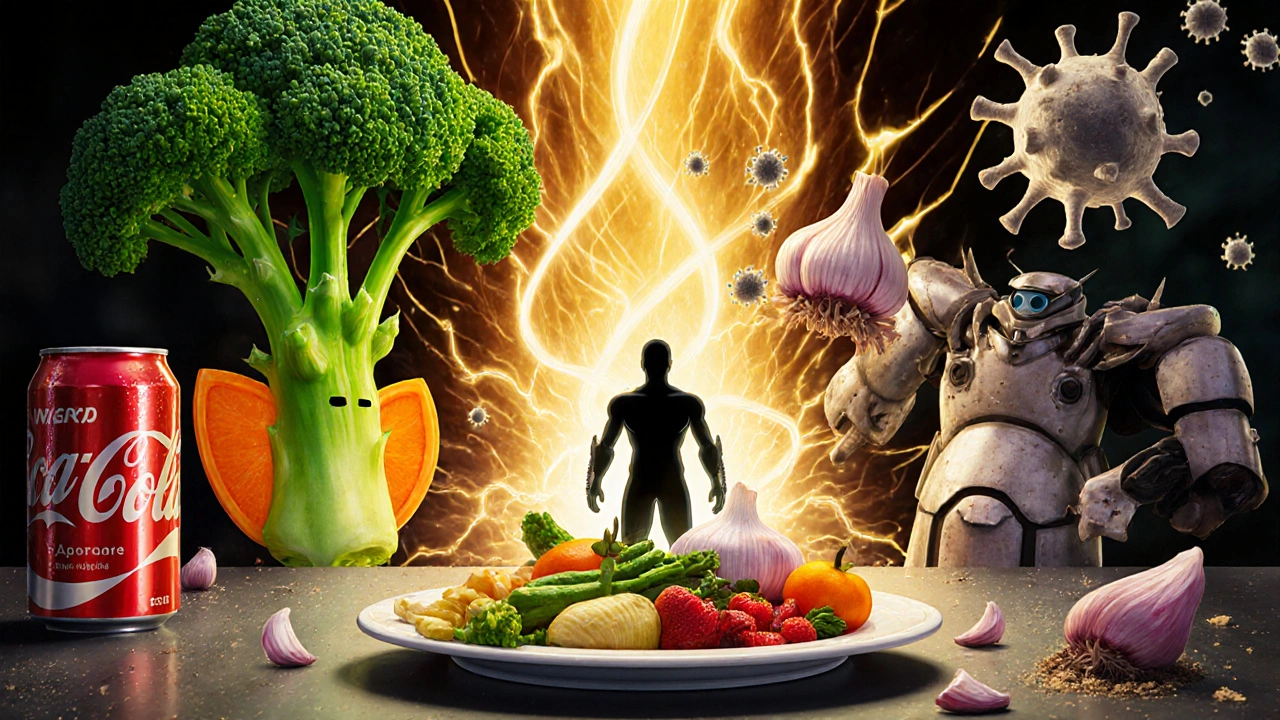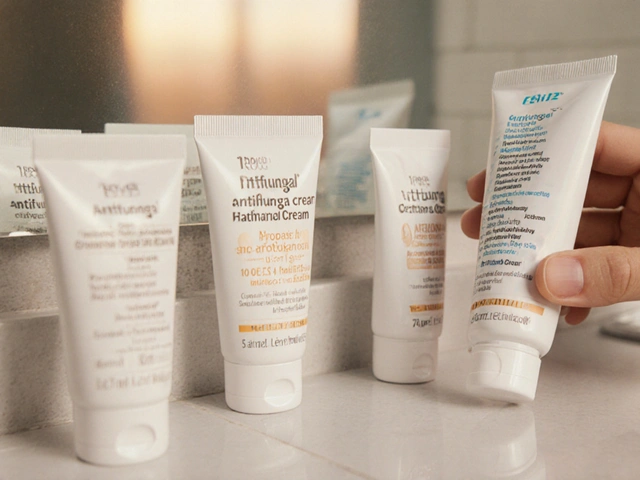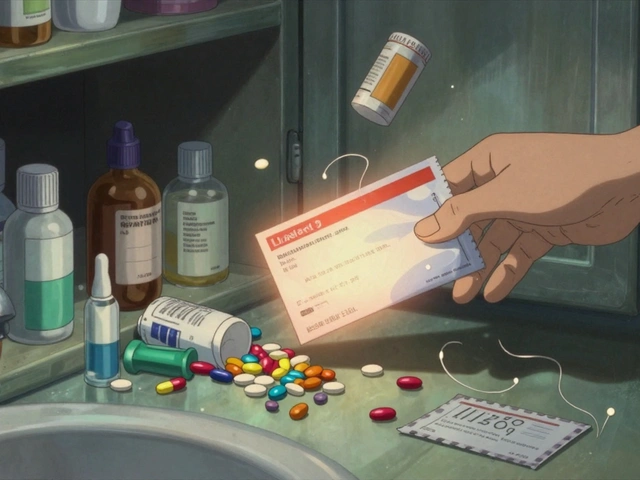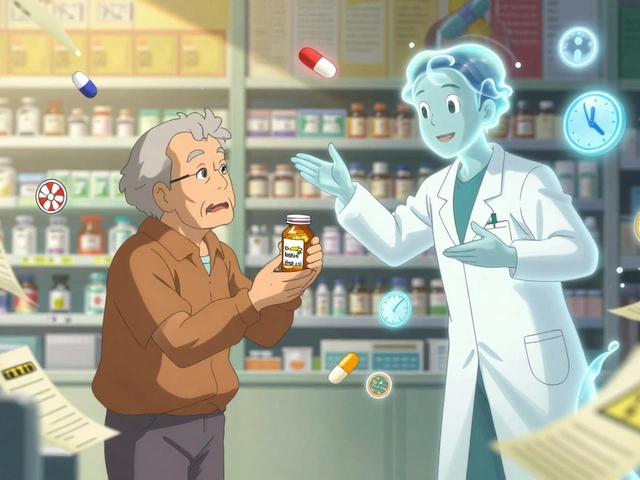What if the best medicine you take every day isn’t a pill, but what’s on your plate? It’s not magic-it’s science. For decades, we’ve been told to rely on doctors and drugs when we get sick. But the truth is, the foundation of your health is built one meal at a time. Nutrition doesn’t just fuel your body-it shields it. The food you eat every day plays a direct role in whether you catch the flu, recover from an infection, or stay strong through winter colds and seasonal stress.
Your immune system runs on food
Your immune system isn’t some separate force that kicks in when you sneeze. It’s alive, constantly working, and it needs real fuel. Think of it like a car: you can’t expect a high-performance engine to run on low-grade gas. The same goes for your body. Without enough vitamin C, your white blood cells can’t move fast enough to fight off viruses. Without zinc, your body can’t produce the antibodies that recognize pathogens. And without enough protein, your immune cells can’t repair or multiply.
A 2023 study from the British Journal of Nutrition tracked over 12,000 adults over two years. Those who ate at least five servings of vegetables and two servings of fruit daily were 37% less likely to get a respiratory infection than those who ate less than two servings. It wasn’t about supplements. It was about whole foods-broccoli, spinach, oranges, berries, garlic, and onions. These aren’t just "healthy"-they’re active defenders.
What actually works? The top five nutrients
Not all nutrients are equal when it comes to fighting sickness. Some are background players. Others are frontline soldiers. Here are the five that make the biggest difference:
- Vitamin D: More than 80% of adults in the UK have low levels, especially between October and March. Low vitamin D is linked to higher rates of colds, flu, and even longer recovery times. Sunlight helps, but in winter, you need food: fatty fish like salmon, egg yolks, and fortified plant milks.
- Zinc: This mineral helps your body make new immune cells and stop viruses from copying themselves. Oysters have the most, but you can also get it from pumpkin seeds, lentils, and beef. Just 15mg a day-about a handful of seeds-can cut your cold duration by nearly two days.
- Vitamin C: It doesn’t prevent colds for most people, but it does make them shorter and milder. Citrus fruits are obvious, but bell peppers have more vitamin C than oranges. Red peppers, broccoli, and kiwi are all better sources than orange juice.
- Selenium: Found in Brazil nuts (just two a day gives you your daily need), selenium helps reduce inflammation and supports your body’s ability to clear out viruses. Low selenium levels are tied to more severe flu outcomes.
- Probiotics: 70% of your immune system lives in your gut. Fermented foods like yogurt, kefir, sauerkraut, and kimchi feed the good bacteria that keep harmful ones in check. A 2024 meta-analysis found people who ate probiotic-rich foods daily had 42% fewer upper respiratory infections over six months.
What to cut out-not just add
It’s not just about eating more good stuff. It’s about stopping the bad stuff from weakening you. Sugar is the silent saboteur. Just 75 grams of sugar-a single can of soda-can suppress your immune cells for up to five hours. That means if you drink a sugary coffee or snack on candy after lunch, your body’s defenses are down for the rest of the afternoon.
Refined carbs like white bread, pastries, and pasta spike blood sugar and trigger inflammation. Chronic inflammation is like a smoldering fire inside your body-it wears down your defenses over time. Studies show people who eat a lot of processed carbs have higher levels of C-reactive protein, a marker of inflammation linked to longer illness recovery.
And alcohol? Even moderate drinking (two drinks a night) reduces your body’s ability to fight off bacteria and viruses. It messes with your gut lining, lowers zinc absorption, and slows down the production of immune cells. If you’re trying to stay healthy, cutting back isn’t just a good idea-it’s a necessary one.

Real food, not supplements
You see ads everywhere: "Boost your immunity with this pill!" But supplements don’t work the same way as food. A single vitamin C tablet doesn’t give you the fiber, antioxidants, and phytonutrients that come with an orange. Whole foods have hundreds of compounds that work together. No lab has figured out how to replicate that synergy.
A 2022 review of 38 clinical trials found that vitamin C, zinc, and vitamin D supplements only helped people who were already deficient. For those with normal levels, supplements made no difference in preventing colds or flu. But people who ate more vegetables, fruits, nuts, and legumes? They stayed sick less often-and when they did get sick, they got over it faster.
That’s why the NHS doesn’t recommend daily supplements for healthy adults. Instead, they say: eat a variety of whole foods. That’s the real supplement.
How to build a sickness-proof plate
You don’t need to be a chef. You don’t need to cook elaborate meals. You just need to make small, consistent changes.
- Start every meal with vegetables. Even if it’s just a handful of spinach in your eggs or carrots with your hummus.
- Swap one processed snack a day for nuts or fruit. Almonds, walnuts, apples, or berries are easy wins.
- Choose whole grains over white bread and pasta. Brown rice, oats, and quinoa keep blood sugar steady and feed good gut bacteria.
- Include a fermented food daily. A spoonful of sauerkraut on your lunch, or a small cup of kefir with breakfast.
- Drink water instead of sugary drinks. Tea with lemon counts too-it’s hydrating and has antioxidants.
These aren’t radical changes. They’re habits. And habits, repeated over weeks and months, change your health.

It’s not about perfection-it’s about consistency
You won’t become immune to sickness overnight. One salad won’t stop a cold. One week of eating clean won’t make you invincible. But if you eat this way 80% of the time, your body builds a stronger, smarter defense system. It learns how to respond faster, recover quicker, and resist infections before they take hold.
Think of it like building muscle. You don’t lift weights once and get strong. You show up, day after day. Nutrition works the same way. Your immune system is a muscle too-and it grows stronger with every healthy bite.
What about children and older adults?
Children’s immune systems are still learning. They get sick more often-not because they’re weak, but because they’re exposed to new germs. Good nutrition helps them build immunity faster. Focus on protein-rich foods (eggs, beans, lean meat), vitamin D (fortified milk or safe sun exposure), and avoiding sugary cereals and juices.
For older adults, the body’s ability to absorb nutrients drops. Zinc and vitamin D become even more critical. Many seniors don’t eat enough vegetables or protein. A simple change-adding a boiled egg or a small serving of lentils to lunch-can make a measurable difference in how often they get sick and how long they stay sick.
Age doesn’t mean you’re doomed to catch every bug. It means you need to be more intentional with food.
When nutrition isn’t enough
Nutrition is powerful, but it’s not a magic shield. You can eat perfectly and still catch a cold. Stress, lack of sleep, and exposure to sick people all play a role. But if your body is well-nourished, you’ll recover faster. You’ll have less severe symptoms. You’ll be less likely to develop complications like pneumonia.
Good nutrition doesn’t promise you’ll never get sick. It promises you’ll get sick less often-and when you do, you’ll bounce back quicker. That’s not hype. That’s biology.
Can eating more fruits and vegetables really prevent colds?
Yes, but not by stopping every cold. Eating more fruits and vegetables strengthens your immune system so you get sick less often and recover faster. A 2023 study found people who ate five or more servings of vegetables and fruit daily had 37% fewer respiratory infections over two years. It’s about building resilience, not creating a force field.
Are vitamin supplements worth taking to prevent sickness?
Only if you’re deficient. For most healthy people, supplements don’t prevent colds or flu. A 2022 review of 38 studies showed no benefit from vitamin C, zinc, or vitamin D pills unless you were already low in them. Whole foods work better because they deliver nutrients in natural combinations your body knows how to use.
Does sugar really weaken your immune system?
Yes. Just 75 grams of sugar-a typical soda-can reduce the ability of white blood cells to fight bacteria for up to five hours. That’s why people who drink sugary drinks regularly get sick more often. It’s not just about calories-it’s about how sugar interferes with immune cell function.
How long does it take for better nutrition to improve immunity?
You’ll start seeing small improvements in energy and recovery within two to four weeks. But real immune system changes-like fewer colds or shorter illness duration-take about three months of consistent healthy eating. It’s a long-term investment, not a quick fix.
Can I eat the same healthy foods every day?
You can, but you shouldn’t. Different foods provide different nutrients. Eating the same few items limits your intake of key compounds. For example, broccoli has sulforaphane; garlic has allicin; blueberries have anthocyanins. Variety matters. Aim for 30 different plant foods a week-that’s the target most nutrition scientists recommend.









Let me guess-this is the same ‘eat your greens’ propaganda pushed by Big Organic and the WHO to keep you docile. They don’t want you to know that vitamin D is actually a hormone your body makes from sunlight-and that the pharmaceutical industry profits more from your sickness than your health. Supplements? A scam. Whole foods? A placebo for the gullible. I’ve been tracking my bloodwork for 12 years-my immune markers only improved when I went completely grain-free, dairy-free, and started drinking colloidal silver. You think broccoli stops colds? Try 5000 IU of D3 daily and 100mg of zinc picolinate-and stop letting corporations tell you what to eat.
Bro, this is spot on. In India, our grandmas knew this before any lab was built-turmeric in milk, garlic in lentils, fermented idli batter. No pills. Just food. I’ve seen my uncle, 72, eat 2 boiled eggs and a bowl of dal with spinach every day-never caught flu for 8 years. You don’t need fancy supplements. Just eat like your ancestors did. And skip the sugar-it’s poison, no matter what the ads say. 🙏
I love how practical this is. I used to think I needed to overhaul my whole diet to feel better. Turns out, just adding one extra serving of veggies to lunch and swapping soda for sparkling water with lemon made a huge difference in my energy. No magic. Just consistency. I’m not perfect-I still eat pizza on weekends-but 80/20 rule works. Your body notices. And honestly? I haven’t had a full-blown cold in 18 months. Not because I’m lucky. Because I ate better.
OMG I KNEW IT. This is ALL a psyop. The CDC, WHO, and Big Pharma? They’re ALL in cahoots. Why? Because if people started eating real food and getting sun, they’d stop buying flu shots, antibiotics, and those damn vitamin D gummies. And who profits from that? NO ONE. They want you weak. They want you dependent. They want you popping pills while they sell you kale chips at $12 a bag. I stopped eating anything with more than 3 ingredients. My sinuses cleared in 3 days. Coincidence? I THINK NOT.
this made me think about my mom. she always said ‘eat your veggies’ and i thought she was just being annoying. but now i see she was right. i started putting spinach in my smoothies last month and i feel less tired. not a miracle, but… better. i still eat junk sometimes but i’m trying. thanks for writing this. it made me feel like i can actually do something.
Bro, I’m from Punjab and we’ve been eating lassi with garlic since forever 😄. One spoon of sauerkraut with lunch? Yes please. My cousin in Delhi got sick last winter-ate nothing but white rice and chai. I sent him a jar of kimchi. He’s still alive. And no, he didn’t thank me. But he’s not sick anymore. 😎
But… what if the ‘whole foods’ are laced with glyphosate? What if the ‘fortified plant milks’ have aluminum? What if the ‘organic’ spinach is sprayed with pesticides that mimic estrogen? We’re being fed lies wrapped in green leaves. I don’t trust any food that comes in a bag. I grow my own. I filter my water. I wear a copper bracelet. And I still get sick. But at least I know they’re lying to me. 🌿💔
5 servings of veggies? Easy. I just add them to everything. Omelet? Spinach. Pasta? Zucchini noodles. Snack? Carrots. Done. No drama. No detox. Just food. You don’t need to be perfect. Just show up. Your body remembers every good bite.
The reductionist framing of immunity as a function of nutrient intake is seductive, yet fundamentally inadequate. The immune system is not a machine to be optimized by input-output ratios. It is a dynamic, self-regulating ecosystem, entangled with neuroendocrine signaling, circadian rhythms, and psychosocial stressors. To ascribe primacy to dietary components alone is to commit a category error-a Cartesian bifurcation of body and context. One may consume all the broccoli in the world, yet remain vulnerable if the soul is in distress. The body does not heal in isolation. It heals in relation.
Erica, you’re the only one here who gets it. But you missed the real truth: the gut-brain axis is manipulated by EMFs from Wi-Fi routers and 5G towers. That’s why even people eating ‘perfect’ diets still get sick. The immune system is being jammed. I stopped using my phone after 6 PM. I sleep in a Faraday cage. I drink distilled water with a pinch of Himalayan salt. My IgA levels? Skyrocketed. The system doesn’t want you to know this. But now you do.